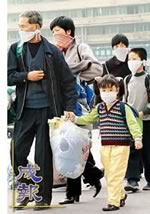The H5N1 virus may well flourish because of political as well as biological conditions.
There is currently an international agreement in place whereby all countries share samples of avian flu virus collected from local incidents. This is an effort to track the various mutations that the virus is undergoing to anticipate how close we are to a mutation that allows human-to-human transmission, and to construct an effective anti-viral for it. At this time, we are told, there are seven or eight sub-varieties of the virus in various stages of adaption to a new host - us.
However, one should be cautious in expecting a pure motive of mutual aid and benefit to be the primary motivator between nations. Nor do we have ample evidence of world wide governments being transparent and forth coming with all pertinent data.
Reports today describe the Indonesian Health Minister accusing the United States of using bird flu samples to produce biological weapons, and consequently Indonesia refuses to submit viral samples to the World Health Organization. Their suspicions have prompted Indonesia to state they intend to resume sharing of bird flu virus samples only if nations agree on a fair and equitable framework. The United States denies Indonesia's accusations.
Indonesia is reported to be the nation worst hit by bird flu. They have held back virus samples since last August and intend to continue to do so until they receive guarantees from richer nations and drug makers that poor countries get access to affordable vaccines derived from their samples.
Indonesia claims that foreign nations misunderstand their non-compliance in the sharing of viral samples, "but concrete cooperation has to be based on fairness."
WHO specifies that sharing samples is vital for tracking the H5N1 virus and for developing vaccines against a potential pandemic. Meetings to work out a new virus sharing draft with key nations are scheduled to take place in March or April.
Thursday, February 21, 2008
Thursday, February 7, 2008
Where Is Our Concern Level Now?
When multiple daily threats compete for our attention and adrenalin supply, it's often difficult to keep all the causes for concern on the front burner, all of the time.
Many of the day-to-day warnings and predictions have come from someone's interest in making money. We are too often bombarded with scare tactics and sensational reportage because someone, somewhere, wants to sell us something. It may be a product they are selling; it may simply be the news they are selling.
Needless to say, we are exhausted by analysing our personal vulnerabilities at every turn we take. A new study tells us that Canadians have lost interest in the influenza pandemic. It no longer "sells".
We are told that fewer than half of Canadians think a pandemic disease outbreak is likely in the next five years, and only one in 10 has drawn up any sort of emergency plan for how their family would cope if one occurred (based on a survey of 4,463 of our friends and neighbours). Science and history assure us that the pandemic event is not an "if" event, but a "when" event.
However, preparation can replace that low level anxiety we experience when we are facing a threat that is not immediate, but real none-the-less. A few simple sheltering-in-place precautions can give you the flexibility to reduce your time spent in public spaces during an influenza crisis. Many internet sites outline supplies to have on hand that could be vital for any emergency from an environmental one to a public health event.
The Calgary Health Region provides one at:
www.calgaryhealthregion.ca/hecomm/envhealth/program_areas/emergency-planning/Documents/AHW-shelter
Preparation = pre-prepare.
Many of the day-to-day warnings and predictions have come from someone's interest in making money. We are too often bombarded with scare tactics and sensational reportage because someone, somewhere, wants to sell us something. It may be a product they are selling; it may simply be the news they are selling.
Needless to say, we are exhausted by analysing our personal vulnerabilities at every turn we take. A new study tells us that Canadians have lost interest in the influenza pandemic. It no longer "sells".
We are told that fewer than half of Canadians think a pandemic disease outbreak is likely in the next five years, and only one in 10 has drawn up any sort of emergency plan for how their family would cope if one occurred (based on a survey of 4,463 of our friends and neighbours). Science and history assure us that the pandemic event is not an "if" event, but a "when" event.
However, preparation can replace that low level anxiety we experience when we are facing a threat that is not immediate, but real none-the-less. A few simple sheltering-in-place precautions can give you the flexibility to reduce your time spent in public spaces during an influenza crisis. Many internet sites outline supplies to have on hand that could be vital for any emergency from an environmental one to a public health event.
The Calgary Health Region provides one at:
www.calgaryhealthregion.ca/hecomm/envhealth/program_areas/emergency-planning/Documents/AHW-shelter
Preparation = pre-prepare.
Subscribe to:
Posts (Atom)






